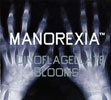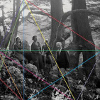 J. G. Thirlwell's Manorexia project is perhaps the most idiosyncratic in a career of idiosyncrasies. As both a specifically solo project and one in which traditional structures are an afterthought, it excels in both the realms of modern composition and pure chaos. Those strengths are magnified on this album, specifically with the inclusion of a 5.1 surround sound mix on DVD, which one of the most creative and effective uses of the format I have yet heard.
J. G. Thirlwell's Manorexia project is perhaps the most idiosyncratic in a career of idiosyncrasies. As both a specifically solo project and one in which traditional structures are an afterthought, it excels in both the realms of modern composition and pure chaos. Those strengths are magnified on this album, specifically with the inclusion of a 5.1 surround sound mix on DVD, which one of the most creative and effective uses of the format I have yet heard.
Two new shows just for you. We have squeezed out two extended release episodes for this weekend to get you through this week. They contain mostly new songs but there's also new issues from the vaults. The first show features music from Rider/Horse, Mint Field, Robert Aiki Aubrey Lowe, Anastasia Coope, ISAN, Stone Music, La Securite, Bark Psychosis, Jon Rose, Master Wilburn Burchette, Umberto, Wand, Tim Koh, Sun An, and Memory Drawings. The second episode has music by Laibach, Melt-Banana, Chuck Johnson, X, K. Yoshimatsu, Dorothy Carter, Pavel Milyakov, Violence Gratuite, Mark Templeton, Dummy, Endon, body / negative, Midwife, Alberto Boccardi, Divine. Cow in Maui from Veronika in Vienna. Get involved: subscribe, review, rate, share with your friends, send images! |



 Collecting ideas from fiction and philosophy, this release clarifies Florian Hecker’s reputation for playfulness and investigation. Like a rogue mathematician who is considering questions which most people will never consider, Hecker attempts to turn metaphysical query into sound. His response to the (strange and hilarious) notion of hyperchaos will be unpalatable for some; but others of us wouldn’t have it any other way.
Collecting ideas from fiction and philosophy, this release clarifies Florian Hecker’s reputation for playfulness and investigation. Like a rogue mathematician who is considering questions which most people will never consider, Hecker attempts to turn metaphysical query into sound. His response to the (strange and hilarious) notion of hyperchaos will be unpalatable for some; but others of us wouldn’t have it any other way. In 2009, filmmaker Olivia Wyatt flew to Ethiopia to document an indigenous music festival (the Festival of a Thousand Stars), only to learn upon her arrival that the government had canceled it.  Rather than admitting defeat, Wyatt opted instead to embark upon an epic road trip, visiting more than a dozen of the tribes associated with the festival on their own (very remote) home turf.  The mesmerizing footage of amphetamine-fueled spirit possession ceremonies, unsettling wedding rituals, and bizarre music videos that resulted boasts some of the strangest things that I have ever seen or heard.
In 2009, filmmaker Olivia Wyatt flew to Ethiopia to document an indigenous music festival (the Festival of a Thousand Stars), only to learn upon her arrival that the government had canceled it.  Rather than admitting defeat, Wyatt opted instead to embark upon an epic road trip, visiting more than a dozen of the tribes associated with the festival on their own (very remote) home turf.  The mesmerizing footage of amphetamine-fueled spirit possession ceremonies, unsettling wedding rituals, and bizarre music videos that resulted boasts some of the strangest things that I have ever seen or heard. These two very different releases are the first formal full-length albums from Michael Jantz's solo guitar project, but he already has a lengthy discography behind him that spans many of cassette culture's most revered labels (Stunned, Housecraft, Digitalis, etc.).  While he covers a wide stylistic range, Jantz never seems like a tourist: he brings an assurance and a laconic charm to everything from banjo playing to neo-krautock.  In fact, he might be one of the only artists that I can think of that can seamlessly bridge the gulf between the rootsy steel string folks and the newer wave of loop-y, laptop-enhanced experimentalists.  He is not infallible though.
These two very different releases are the first formal full-length albums from Michael Jantz's solo guitar project, but he already has a lengthy discography behind him that spans many of cassette culture's most revered labels (Stunned, Housecraft, Digitalis, etc.). ¬†While he covers a wide stylistic range, Jantz never seems like a tourist: he brings an assurance and a laconic charm to everything from banjo playing to neo-krautock. ¬†In fact, he might be one of the only artists that I can think of that can seamlessly bridge the gulf between the rootsy steel string folks and the newer wave of loop-y, laptop-enhanced experimentalists. ¬†He is not infallible though. Stunning and devasting from beginning to end, this Triosk member's solo debut emotes relentlessly, unrestrained by any prescribed genre boundaries. To futilely classify this pensive meisterstück, as some critics are wont to do, defies sense, as the piano-driven music in effect speaks for itself, in despondent whispers and virtual screams.
Stunning and devasting from beginning to end, this Triosk member's solo debut emotes relentlessly, unrestrained by any prescribed genre boundaries. To futilely classify this pensive meisterstück, as some critics are wont to do, defies sense, as the piano-driven music in effect speaks for itself, in despondent whispers and virtual screams.
